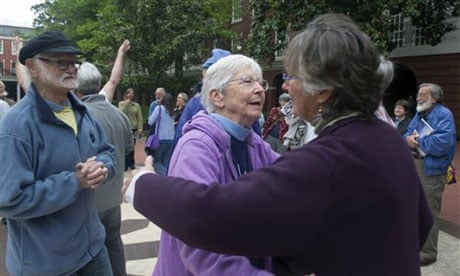An octogenarian Roman Catholic nun, jailed for breaking into a nuclear weapons facility in Tennessee, is facing up to 30 years in prison after losing her plea for the most serious charge to be dropped.
Sister Megan Rice, 83, and two fellow peace activists staged a non-violent protest to symbolically disarm the Oak Ridge Y-12 nuclear weapons facility, home to the nation's main supply of highly enriched uranium, in July. They were initially charged with trespassing, a misdemeanor punishable by up to a year in prison, but felony charges quickly followed. They were eventually convicted of interfering with national security and damage to federal property.
This week, a judge denied a motion to acquit them of interfering with national security under the sabotage section of the US criminal code, which carries the harshest prison sentence of up to 20 years. Rice and her two fellow activists, Greg Boertje-Obed, 57, a carpenter, and Michael Walli, 68, a veteran, now face up to 30 years in prison, although the ruling by district judge Amul Thapar, in the eastern district of Tennessee, suggests their sentences will be more lenient than the maximum allowed.
The three describe themselves as 'Transform Now Plowshares', a reference to a passage in the bible, Isaiah 2:4, which states: "They shall beat their swords into ploughshares and their spears into pruning hooks; nation shall not lift up sword against nation, neither shall they learn war any more."
They are currently in the Irwin County detention center, Georgia, awaiting their sentence.
In his ruling denying the so-called Rule 29 motion, Thapar writes: "The defendants are entitled to their views regarding the morality of nuclear weapons. But the defendants' sincerely held moral beliefs are not a get-out-of-jail-free card that they can deploy to escape criminal liability."
Bill Quigley, a law professor at Loyola University-New Orleans who works pro bono for the three, said "everybody is disappointed" by the decision. "We believe really strongly that they did not do anything that could be constituted as sabotage or violating the national security of the US. The prosecution admits that national security was not damaged. Their theory is that even though it wasn't damaged, the protesters intended to."
However, he said he took heart from the judge's acknowledgment that the non-violent nature of the protesters and their characters would be taken into consideration at sentencing.
The New York Times described the break-in as he "the biggest security breach" in the nation's atomic history.
The protesters argue that while they entered the plant with the intention of causing some symbolic damage, including painting slogans on buildings, their non-violent behaviour and peaceful natures could not be interpreted as trying to interfere with national defence. They argued that no reasonable jury could have found intent to cause harm, that the government had failed to prove any intent, and that their non-violent actions did not actually damage national defence.
However, in his ruling dated 1 October, the judge cites the defendants' phone calls made while in custody, including one in which Rice said the three entered Y-12 to "begin the work of disarmament"; Thapar argues this was evidence that they acted to frustrate the plant's mission to store and enrich uranium. The mission, he says, was among "activities of national preparedness".
At one point in the ruling, the judge refers to the sabotage charge and asks the question: "But what about the fact of the defendant's non-violence – does it make sense to deal as harshly with non-violence protesters as with foreign saboteurs?" He concludes that, the court must interpret the criminal statute by its terms and "cannot fashion case-by-case exceptions of sympathetic defendants". He goes on to say the defendants' non-violence will be relevant at sentencing.
The court must account for both the "nature and circumstances of the offense and the history and characteristics" of the defendants, he says. He also dismissed the defendants' Rule 33 motion, requiring a retrial based on the prosecutor's alleged misconduct.
Ralph Hutchinson, co-ordinator for Oak Ridge Environmental Peace Alliance, said he was disappointed but not surprised by the ruling. He said he spoke to Rice after the ruling and she told him: "We're fine, we're fine, it's all good."
Hutchinson said: "We did not expect the judge to rise to the occasion. The judge did say, though, he felt constrained by the technical language of the law and suggested he is not going to be overly harsh at sentencing."
Sentencing is scheduled for 28 January next year.

Comments (…)
Sign in or create your Guardian account to join the discussion